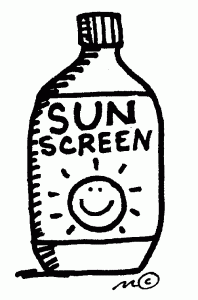 It’s only May, but I’m already slathering sunscreen on my kids each morning before school. Every year, before I stock up on our summer supply, I check with Environmental Working Group’s annual sunscreen report to make sure the formulation my family uses is as effective and safe as possible.
It’s only May, but I’m already slathering sunscreen on my kids each morning before school. Every year, before I stock up on our summer supply, I check with Environmental Working Group’s annual sunscreen report to make sure the formulation my family uses is as effective and safe as possible.
The report rates more than 1,000 sunscreens, 600 moisturizers and 100 lip products. The products are labeled on a scale of one to ten based on industry, government and academic data sources and a review of the technical literature on sunscreens. The products are rated in four areas: Health hazards associated with listed ingredients, UVB protection, UVA protection and stability.
The report also includes an extensive on-line database that allows you to search for a sunscreen product.
This year’s report has some interesting observations summarized in a tip sheet for consumers. Among them:
- Many sunscreens include vitamin A because it’s found to combat skin aging, but studies indicated it might trigger the development of skin tumors when used in the sunlight.
- Wearing sunscreen doesn’t mean you are completely avoiding sun damage to your skin. That’s because UVA rays damage DNA and skin cells, accelerate aging and may contribute to skin cancer. But many sunscreens sold in the U.S. do not provide good UVA protection. And applying too little sunscreen can also hamper a product’s UVA protection.
- Sunscreen ingredients can effect hormones and cause skin allergies. I know about this first-hand because my son has had allergic reactions to sunscreen. Now he only uses “mineral” sunscreens made with zinc and titanium. But many products use “nano-particles,” and there is little evidence what effect this will have over the long-run.
The group also notes that spray-on sunscreens that use aerosol – while extremely popular with parents and children who struggle to get sunscreen on – are often inhaled, where they can irritate lung tissue or pass into the bloodstream.
The take-home message: Choosing a sunscreen that fully protects your skin from the sun without contributing to other health problems can be a tricky proposition. But a little bit of research can go a long way into finding a product that is safe and effective.
Happy summer!



Sunscreens are a must in most countries, while you could get away not wearing it daily if you love somewhere with always bad weather, it is still best practice to wear it as the UVA rays can go through clouds. Sunscreens do have some added products for eg. fragrance, or chemical glue. This can cause skin irritation or acne. But yea, even if you get some skin irritation, change sunscreen, but definately wear it every day!